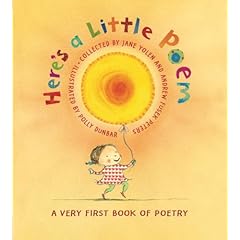 I'm in love with Here's a Little Poem: A Very First Book of Poetry, a collection of poetry from children's authors. Each poem is beautifully illustrated and as the title suggests, it truly is geared to the toddler-preschool age group.
I'm in love with Here's a Little Poem: A Very First Book of Poetry, a collection of poetry from children's authors. Each poem is beautifully illustrated and as the title suggests, it truly is geared to the toddler-preschool age group.In reading poetry to children, they hear words and syntax that differs from the way we talk every day. They develop an ear for it and this helps them become better listeners and readers. Poetry often has rhyming words. Rhymes are especially important to young listeners and rhyming is critical in early childhood to help build later reading and spelling skills. Listening for rhymes and "matching" up rhyming words is a great skill for pre-readers.
The poems in this book are perfect for younger readers, my 3 year old son often chooses this book as his night time story and we read about a dozen or so poems in one sitting. The book is organized into different sections like 'my family' and 'all about me', themes familiar to this age group.
As children get older you can introduce them to Shel Silverstein, a classic children's poet. His poems are wonderful but sometimes above little one's understanding or breadth of knowledge. I love his poems because you often have to guess from the context clues what the subject of the poem is. This is another great skill poetry teaches, metaphors in reading and comprehension. I also love Jack Prelutsky's poetry collections so be sure to check them out as well. His poems deal with childhood themes and subjects with a great touch of humor.
To end, I'd like to share my favorite poem as of late:
There Was a Child Went Forth
by Walt Whitman
by Walt Whitman
There was a child went forth every day;
And the first object he look'd upon, that object he became;
And that object became part of him for the day, or a certain part of
the day, or for many years, or stretching cycles of years.
The early lilacs became part of this child,
And grass, and white and red morning-glories, and white and red clover, and the song of the phoebe-bird,
And the Third-month lambs, and the sow's pink-faint litter, and the mare's foal, and the cow's calf,
And the noisy brood of the barn-yard, or by the mire of the pond-side,
And the fish suspending themselves so curiously below there--and the beautiful curious liquid,
And the water-plants with their graceful flat heads--all became part of him.
The field-sprouts of Fourth-month and Fifth-month became part of him;
Winter-grain sprouts, and those of the light-yellow corn, and the esculent roots of the garden,
And the apple-trees cover'd with blossoms, and the fruit afterward,
and wood-berries, and the commonest weeds by the road;
And the old drunkard staggering home from the out-house of the tavern, whence he had lately risen,
And the school-mistress that pass'd on her way to the school,
And the friendly boys that pass'd--and the quarrelsome boys,
And the tidy and fresh-cheek'd girls--and the barefoot negro boy and girl,
And all the changes of city and country, wherever he went.
His own parents,
He that had father'd him, and she that had conceiv'd him in her womb, and birth'd him,
They gave this child more of themselves than that;
They gave him afterward every day--they became part of him.
The mother at home, quietly placing the dishes on the supper-table;
The mother with mild words--clean her cap and gown, a wholesome odor
falling off her person and clothes as she walks by;
The father, strong, self-sufficient, manly, mean, anger'd, unjust;
The blow, the quick loud word, the tight bargain, the crafty lure,
The family usages, the language, the company, the furniture--the yearning and swelling heart,
Affection that will not be gainsay'd--the sense of what is real--the thought if, after all, it should prove unreal,
The doubts of day-time and the doubts of night-time--the curious whether and how,
Whether that which appears so is so, or is it all flashes and specks?
Men and women crowding fast in the streets--if they are not flashes and specks, what are they?
The streets themselves, and the façades of houses, and goods in the windows,
Vehicles, teams, the heavy-plank'd wharves--the huge crossing at the ferries,
The village on the highland, seen from afar at sunset--the river between,
Shadows, aureola and mist, the light falling on roofs and gables of white or brown, three miles off,
The schooner near by, sleepily dropping down the tide--the little boat slack-tow'd astern,
The hurrying tumbling waves, quick-broken crests, slapping,
The strata of color'd clouds, the long bar of maroon-tint, away
solitary by itself--the spread of purity it lies motionless in,
The horizon's edge, the flying sea-crow, the fragrance of salt marsh and shore mud;
These became part of that child who went forth every day, and who now goes, and will always go forth every day.



1 comment:
Post a Comment